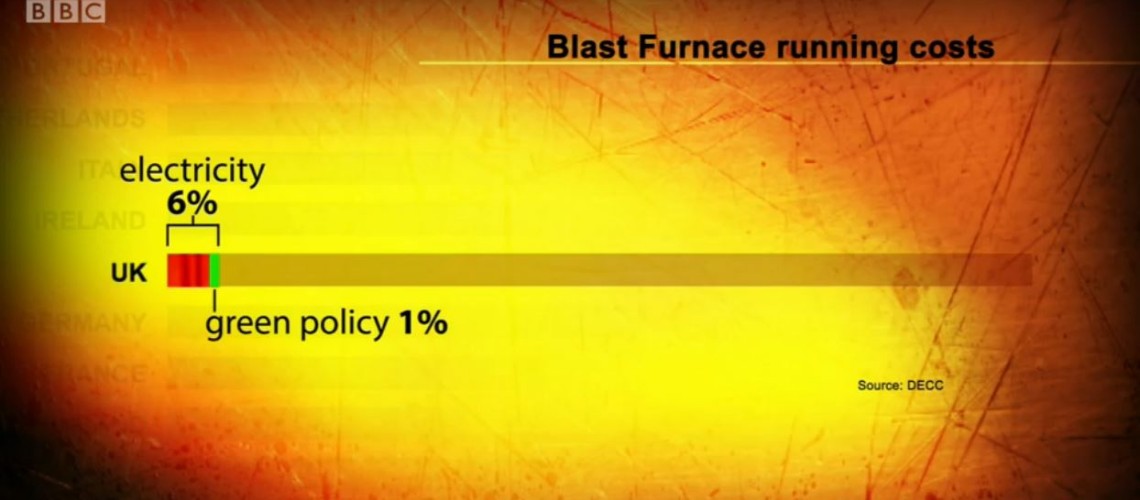Newsnight claim: ‘green’ costs are irrelevant to the future of Tata steel
CABBAGE PATCH: Radio 4’s magazine programme More or Less, which seeks to debunk and correct the misuse of numbers and statistics, has been attempting to arrive at the truth about a claim by Eurosceptics that the EU has rules about cabbage growing that add up to 26, 911 words. It’s a botched job – and shows worrying keenness to aim fire at the anti-EU side. On the plus side – although not too much, because a moment’s digging on Google reveals the true facts – the programme has established that the EU regulations affecting vegetable production have never been that long (at most around 2,500 words), and not only that, 26,911 number seems to have been both fabricated and used almost ad lib to cover other negative claims about EU rules. Thereafter, the programme entered far murkier waters. It claimed that all EU regulations relating to vegetable farming had moved into the form of an advice booklet, and the specific regulations had been repealed. This, however, is only partially the truth, and highly misleading. The reality – as the EU Referendum website points out here – is that yes, the relevant EU regulations were repealed in 2009, but only because the EU decided, under the growing weight and influence of international law, to subcontract the whole field to a higher body, the United Nations Economic Commission for Europe (UNECE). It did not abandon or see the light about cabbage regulation, but instead was forced to outsource it. The replacement regulation is 1,606 words, not dissimilar from what it was before. More or Less is a series and might balance this clearly anti-Brexit item with something equally iconoclastic; but an issue here is that in its efforts to attack the anti-EU camp, it aimed at a pretty rickety (if not downright preposterous) target and in so doing could not even get its facts right.
BIAS BY OMISSION: One of the major points of debate in the Tata steel story is the role played by escalating energy costs in an energy intensive industry. The anti-EU side says that price hikes in electricity forced upon companies by EU climate change directives, working in tandem with the 2008 UK Climate Change Act, and the new punitive carbon trading taxes, have put not just Tata, but the whole of UK manufacturing industry in danger. The other signs of this are the closure earlier this year of the Redcar steel plant, and before that, on Anglesey, of an aluminium smelting plant. The pro-EU (and green) lobby, for example, Labour deputy leader John McDonnell, argue otherwise – they say that energy is only around one percent of steel production costs and thus coincidental in Tata’s current woes. Where does the BBC fit in this equation? Newsnight on Tuesday night looked at the issue – and through the lens of a report by a Financial Times journalist decided to come down heavily on the ‘marginal cost’ side. Flying in the face of opinion from a steel industry spokesman that such costs did matter, the FT man reiterated the same 1% figure as John McDonnell, and this was rammed home to viewers by graphics, together with opinion from Lord Deben (formerly John Selwyn Gummer), who for years has been advocating extreme climate alarmism. The concerns of anti-EU side were thus unceremoniously junked. There was no attempt to bring into play opinion such as this from the climate and energy expert Paul Homewood, who spells out here why the reality of continually escalating electricity prices make production in the UK untenable – and a flight to plants in cheaper energy regimes such as Thailand (already the home of Tata production) the only viable options for the future. Homewood’s figures – together with arguments from the respected commentator Matt Ridley – are summarised here by James Delingpole. For years, News-watch research has shown that the BBC has been ignoring opinions that run counter to climate change alarmism. It is continuing with the Newsnight coverage of the Tata story, and adds up to pronounced, deliberate bias against elements of the anti-EU case. As the referendum looms, that’s very serious bias by omission.

